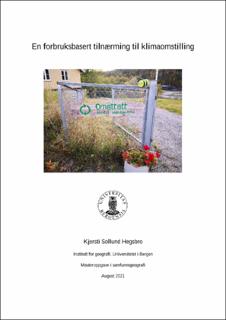| dc.contributor.author | Hegsbro, Kjersti Sollund | |
| dc.date.accessioned | 2021-09-06T23:42:33Z | |
| dc.date.available | 2021-09-06T23:42:33Z | |
| dc.date.issued | 2021-08-02 | |
| dc.date.submitted | 2021-08-31T22:00:15Z | |
| dc.identifier.uri | https://hdl.handle.net/11250/2773865 | |
| dc.description.abstract | Norske kommuner har tradisjonelt fokusert på å redusere de direkte utslippene som fysisk slippes ut innenfor deres geografiske område (produksjonsbasert tilnærming), i tråd med både nasjonale og internasjonale forpliktelser. Nyere forskning om klimaomstilling og bærekraftig forbruk vektlegger imidlertid viktigheten av å inkludere indirekte utslipp (forbruksbasert tilnærming) i klimaarbeidet. Denne studien utforsker derfor hvilke muligheter og utfordringer som oppstår i realiseringen av en forbruksbasert tilnærming til klimaomstilling i Asker kommune. Dette gjør jeg ved å anvende rammeverket til O’Brien og Sygna (2013) tre sfærer for transformasjon som overordnet linse, med en intensjon om å utvikle en helhetlig og kontekstuell forståelse av hvordan dette arbeidet utspiller seg i Asker. Feltarbeidet har bestått av 18 semi-strukturerte intervjuer med aktører fra administrasjonen, politikere, utvalgte samarbeidsaktører og forskere. Som et supplement har jeg også gjennomført deltakende observasjon under interne møter, besøkt et av de lokale initiativene, deltatt på konferanser og nettverkssamlinger, samt analysert diverse sekundærkilder. Studien har vist hvordan en forbruksbasert tilnærming til klimaomstilling representerer et utvidet handlingsrom og aktørmangfold i Asker kommune. Studien har også vist hvordan diskursen om den grønne økonomien dominerer blant de kommunale aktørene (den personlige sfære), hvilke implikasjoner dette har for hvordan aktørene oppfatter den eksisterende styringskonteksten og hvordan de navigerer seg innenfor dette handlingsrommet (den politiske sfære), samt hvilke løsninger som oppfattes som logiske og mulige (den praktiske sfære). Indirekte utslipp reduseres i hovedsak til et teknisk anliggende med et fravær av «det politiske», og det stilles i liten grad spørsmål ved de grunnleggende drivkreftene som har forårsaket status quo. Det finnes imidlertid tendenser til at diskursen om nedvekst også er forankret hos noen utvalgte aktører, og at en slik endring i den personlige sfære har hatt stor innvirkning på arbeidet med indirekte utslipp. I tillegg eksisterer det flere potensielle utløsende faktorer for transformasjon. Jeg vil spesielt fremheve hvordan sirkulær økonomi kan fungere som en endringsdiskurs med et potensiale til å diskursivt skille den grønne økonomien fra grønn vekst. | |
| dc.description.abstract | Norwegian municipalities have traditionally focused on reducing direct emissions from within their geographical borders (production-based approach), corresponding with both national and international commitments. However, recent literature on climate transitions and sustainable consumption emphasizes the importance of including indirect emissions (consumption-based approach) for climate policy. Therefore, this study explores the possibilities and challenges that occur when applying a consumption-based approach to climate transition in Asker municipality. By using the framework of O’Brien and Sygna (2013) the three spheres of transformation as an overall lens, I aim to develop a holistic and contextual understanding of how this process occur in Asker. The fieldwork consisted of 18 semi-structured interviews with various actors from the municipality administration, politicians, stakeholders, and researchers. In addition, I have conducted participatory observation during internal meetings, visited one of the local initiatives, participated in conferences and network gatherings, and analyzed a selection of secondary data. This study has shown how a consumption-based approach to climate transition creates an extended space of involved actors and potential policy measures in Asker municipality. This study has also shown how the green economy discourse dominates among the municipal actors (the personal sphere), what implications this has for how the actors perceive the existing governance context and how they navigate within this space (the political sphere), and what type of solutions that are perceived as logical and possible (the practical sphere). Indirect emissions are primarily reduced to a technical issue with an absence of «the political», with little reflections about the fundamental driving forces that have caused the status quo. However, the degrowth discourse is also present among some actors, and related changes in the personal sphere have had significant influence on the efforts to reduce indirect emissions. In addition, there are multiple potential leverage points for transformation. Especially, I want to emphasize how the circular economy can function as a transformative discourse with the potential to discursively separate green economy from green growth. | |
| dc.language.iso | nob | |
| dc.publisher | The University of Bergen | |
| dc.rights | Copyright the Author. All rights reserved | |
| dc.title | En forbruksbasert tilnærming til klimaomstilling | |
| dc.title.alternative | A consumption-based approach to climate transition | |
| dc.type | Master thesis | |
| dc.date.updated | 2021-08-31T22:00:15Z | |
| dc.rights.holder | Copyright the Author. All rights reserved | |
| dc.description.degree | Masteroppgave i geografi | |
| dc.description.localcode | GEO350 | |
| dc.description.localcode | MASV-GEOG | |
| dc.description.localcode | MPGEOGR | |
| dc.description.localcode | MASV-MEHA | |
| dc.description.localcode | MASV-PHYG | |
| dc.subject.nus | 733111 | |
| fs.subjectcode | GEO350 | |
| fs.unitcode | 15-41-0 | |
